Welcome to a new contributor
Who feels like a Martian seeing the situation in the Church today
Translated from
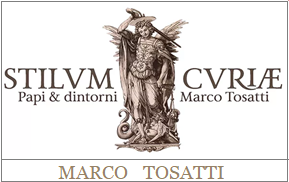
January 11, 2019
Today we welcome to our small community of writers a new personage, Osservatore Marziano, who explains the why and how of his participation, and his choice of pseudonym:
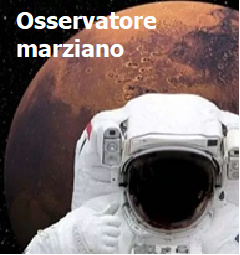 I ask for your hospitality, though with limited frequency, but I would prefer not to say who I am except to you. Having worked for a long time as a contributor to L’Osservatore Romano, I am using the pseudonym Osservatore Marziano for a very simple reason.
I ask for your hospitality, though with limited frequency, but I would prefer not to say who I am except to you. Having worked for a long time as a contributor to L’Osservatore Romano, I am using the pseudonym Osservatore Marziano for a very simple reason.
What I am seeing and hearing, when Catholics speak of the pope or the president of the Italian bishops’ conference (CEI), does not seem real! I no longer feel I am a terrestrian apostolic Roman Catholic – but rather, like a Martian who does not understand what the Church is becoming, and consequently, what will happen to the concept of good and evil.
Remember the little tale of the great Dino Buzzati [1907-1972, Italian novelist, poet, painter and journalist] abut the flying saucer that landed in front of a small country church? Let me recount it to you briefly, in my own words:
One night, while he was looking at the stars, a holy curate who had been sent to serve a small mountain village (perhaps because he celebrated the Tridentine Mass?), lamenting that he could no longer exercise his vocation to evangelize, saw a star that seemed to be advancing towards him rapidly. It was a flying saucer which landed in the small churchyard. It opened and some Martians descended.
Not at all intimidated, the priest thought to himself, “The good God has listened to me and sent me some Martians whom I can convert”. He approached them, made sure he could speak to them and be understood, and started to tell them about the Gospel of Christ. The Martians made it clear they understood perfectly what he was talking about. So when he got to narrating the Last Supper, they interrupted him to say, “So the Son of the Creator also came here to redeem you? Where is he that we may go adore him in his earthly incarnation?”
The priest said, “If you had let me finish, I was going to say that God incarnated on earth was crucified by men…” The Martians changed color, stiffened up, and spoke agitatedly among themselves. “The Son of the Creator also came here, and these creatures crucified him? Let’s not stay here any longer” So they got back into their flying saucer and took off, leaving the poor priest stunned.
As I said, I too feel like a Martian when I observe what is happening in the Holy Church established by Christ before he was crucified – I don’t recognize her anymore, and I feel like fleeing.
A few days ago, I heard the Supreme Pontiff say that it is horrible to refuse admission to refugees fleeing wars, famines, hunger, environmental dangers. But that is not true at all – these mass migrations are not primarily explained by such reasons. Just look at those wo are arriving – they are almost all young men between 20-30 years of age, very few families and no old people.
Is the pope lying? He celebrates Mass, recites the Angelus, and then he incites contempt and even hatred towards those who are concerned about poor Italians, old Italians, the security of Italians. He could be right. But why does he not treat them like a loving father, correct them paternally if he wishes, instead of simply writing them off as contemptible? Why?
Influential editorial declares
this Pontificate a failure:
Should we hope for an end to hyper-papalism?
by Fr. Richard Cipolla

Jnaanary 12, 2019
The very recent publication of the editorial by R.R. Reno, the editor of
First Things, declaring the pontificate of Pope Francis a “failure” ("A Failing Papacy", Feb. 2019 issue), is both newsworthy, and
more importantly the beginning, we hope, of an intellectual examination of the present papacy that will result in an honest assessment of the present papacy and, one further hopes, a call for an end to the hyper-papalism of the past years - perhaps even over a century - as well as a theological reassessment, based on the Tradition of the Church, of the nature and role of the papacy.
That the editor of
First Things, which became for some years, in my personal assessment, an organ for the Neo-Conservative agenda, has written this editorial may not catch the attention of the
New York Times, but it certainly is significant among those Catholics who understand the Tradition of the Church and who have been and are greatly disturbed by the failure of this pontificate to articulate clearly and unambiguously the Catholic Faith in a time of political and cultural mass confusion.
Reno must be thanked for his courage and his clarity with regard to the current situation in the Church.
Reno now understands that this papacy is not only not consonant with St John Paul II’s real attempt, grounded in the Tradition of the Church, to re-anchor the Catholic Faith in the person of Jesus Christ and the dogma of the Church after the threatened collapse of Church teaching and liturgical praxis after the Second Vatican Council.
This papacy, with its lack of fidelity to the Tradition and its cheap and outdated appeals to Modern Man ironically at a time when Modernity no longer exists except in the Roman Curia who are still living in 1965, has lost touch with those Post-Modern men and women, especially youth, who are searching for what is real and true in the detritus of Modernity.
Not only has this pontiff and his coterie not articulated the Catholic faith both to faithful Catholics and to the disbelieving and hostile world. Tthey also seem determined to accommodate the Catholic faith to the contemporary zeitgeist and all in the name of –
mirabile dictu — mercy. And this mercy without the Cross of Jesus Christ.
The very idea of a Savior of the world becomes not necessary when the very understanding of sin, central to Christianity, is emptied out by an anti-intellectualism and sentimentality that both deny the intellectual/doctrinal history of the Church and posit, in the words of one of the Pope’s more out spoken members of the inner circle, Fr. Thomas Rosica,
a version of the Church presided over by a pope who is free from the demands of the Christian faith.
This Canadian priest has infamously told us that
Pope Francis breaks Catholic traditions whenever he wants, because he is “free from disordered attachments. Our Church has indeed entered a new phase: with the advent of this first Jesuit pope, it is openly ruled by an individual rather than by the authority of Scripture alone or even its own dictates of tradition plus Scripture.”
This disordered lunacy could be an entertaining segment on a comedy show.
But that such a statement does not cause Cardinals and Bishops to rise up and condemn such an unCatholic and unChristian statement is evidence both of the state of the Catholic hierarchy and of the intellectual level of those in charge of the Church (at least in charge in this world.)
This is why we must hope that Reno’s editorial is the beginning of an intelligent and honest assessment of this papacy that espouses an agenda that certainly does not have Christ and His Cross at its center, and in fact, goes out of its way not to speak words like Savior, Redemption, the Way, the Truth and the Life, that refuses to speak about the difficulty of leading a moral life based on the teachings of Christ and His Church, and an agenda that refuses to preach and teach the radical nature of the Incarnation that changes human history forever and in one specific way – the Cross and Resurrection - that demands the attention of every man and woman in this world, demanding a decision that is ratified in eternity.
The Zanchetta case:
A fatal blow to the Pope’s
reputation as a reformer
By Phil Lawler

January 11, 2019
Last week the Vatican acknowledged that an Argentine bishop working at the Vatican faces sex-abuse charges. The story drew little attention from American media outlets, and understandably so: just one more in a long line of complaints against clerics, in this case involving a bishop whose name (Gustavo Oscar Zanchetta) was unfamiliar to readers in the US.
But reporters who look at the story just a bit more carefully recognize it as a blockbuster: a potentially fatal blow to the reputation of Pope Francis as a reformer.
The facts, in brief: Zanchetta was appointed Bishop of Oran by Pope Francis in July 2013. He had served under the future Pontiff on the staff of the Argentine bishops’ conference, and was one of the new Pope’s first episcopal appointments. He abruptly resigned, however, just four years later, leaving the city without warning, at the age of just 53. At the time Bishop Zanchetta cited health reasons for his departure.
Today Vatican officials say that he stepped down because of administrative problems; he had developed a rocky relationship with the priests of his diocese. After a few months without assignment (during which he showed no signs of ill health), Pope Francis gave him an important post at the Vatican
[created especially for him] at the Administration of the Patrimony of the Apostolic See (APSA), the agency that handles the Vatican’s investments and its enormous real-estate holdings.
On Christmas Day, the Argentine newspaper
El Tribuno revealed that Bishop Zanchetta had been accused by seminarians of sexual abuse. The Vatican insists that these charges were lodged only recently, and had nothing to do with his resignation from the Oran diocese.
El Tribuno disagrees, saying that the charges date back to 2015 and were the reason for his removal. Readers can decide for themselves which claim seems more credible.
Now why is this bishop’s story so important? John Allen of Crux took the first step in explaining the significance of the Zanchetta case, noting that it is embarrassing to Pope Francis for two reasons.
- First, just as the Vatican is preparing for a February meeting on sexual abuse, here is another case in which the Pontiff himself has apparently protected — indeed promoted — a prelate with a questionable background.
- Second, the particular job that Zanchetta was given in Rome, with APSA, put the Argentine bishop into an office that is at the very center of debates about financial accountability.
How serious could the Pope be about financial reforms, if he arranged a soft landing for a troubled bishop as the second-ranking official at an agency that has been criticized for making sweetheart deals, arranging no-bid contracts, undervaluing assets, and resisting independent audits?
Sandro Magister, the veteran Vatican-watcher for
L’Espresso, took the analysis a few steps further.
- If Zanchetta had been persuaded to resign because of his administrative deficiencies, he asked, why was he given an administrative job at APSA?
- And why was he placed in an agency handling financial affairs, when the accounts of the Oran diocese were reportedly in a shambles?
- What exactly was he doing at APSA, in a post (“assessor”) that had not existed before his appointment?
Magister also probed into the seminarians’ abuse charges, questioning whether Pope Francis had been aware of those complaints in 2017 when the bishop resigned, and had chosen to ignore them — just as, a few years earlier, he had dismissed charges against the Chilean Bishop Juan Barros; just as, according to Archbishop Vigano, he ignored complaints about then-Cardinal Theodore McCarrick.
Even without the Vigano testimony, however, and even without the precedent of Bishop Barros,
it is undeniably true that in this case, Pope Francis appointed a bishop with a problematical past to a very sensitive position. That fact would be shocking enough, if it were an unprecedented move by the Pope. But it is not.
Along with APSA, the Vatican institution most central to any bid for financial reform is the Institute for Religious Works (IOR), commonly known as the Vatican bank. In 2013, Pope Francis appointed Msgr. Battista Ricca as prelate of the IOR. Years earlier, Msgr. Ricca had reportedly brought a boyfriend along with him to a posting as a Vatican diplomat. Questioned about the prelate’s past, Pope Francis offered his famous rhetorical question: “Who am I to judge?” Msgr. Ricca remains at his post at the IOR.
Both Bishop Zanchetta and Msgr. Ricca have been charged with abusing their offices and with sexual misconduct. Yet Pope Francis has found jobs for them at the Vatican — and not just any jobs, but jobs in which they are responsible for detecting misconduct by other Church officials.
Let me put it plainly: Both were obvious potential targets for blackmail. And they were put in positions where they might have ample opportunity to blackmail others.
The Zanchetta case demonstrates that Pope Francis continues to protect his friends and allies, regardless of his professed commitment to accountability.
- This one case illustrates how, since Francis was elected, the Vatican has actually moved backward on two crucial fronts: the fight against sexual abuse and the quest for financial transparency.
-
In this pontificate, the cause of reform is dead, unless the reform begins with the Pontiff himself.
I bet Andrea Gagliarducci's next Vatican column will continue to see silver linings and roseate prospects for Bergoglio's so-called 'reforms' and other aspects of this failing pontificate. What will it take to pop his helium isolation bubble and bring him down to earth with a painful thud!
Yet another blogpost from Marco Tosatti - two for January 12, in fact:
The nuncio's New Year's day homily in Medjugorje:
Propaganda on migrants drives away many faithful
Translated from

January 12, 2019
At a time when migrantist propaganda is reaching paroxystic levels, the institutional Church is not letting up. Of course, the drastic reduction in the human trafficking coming into Italy has hit the wallets of not a few persons and organizations who have profited from it.
Perhaps this explains the indignation of Italian cardinals and bishops - one they have not had against abortion same-sex unions and a series of other Italian laws against life, family and Christian morality.
But of course, these are the laws promulgated by their friends in the Partito Democrata
[the once ruling party soundly rebuffed by Italians last year who voted in a government by centrist parties like the Lega and the Five-Star movement]. Pope Francis has called the author of the SSM law, Senator Monica Cirinna, a great Italian.
We report belatedly the testimony of a friend who went to Medjugorje to ring in the New Year. It was pubished earlier on the blogsite ‘Campari e De Maistre’. We supplement it with the photo of one of those ideological Nativity scenes created these days, about which it is kinder not to comment.
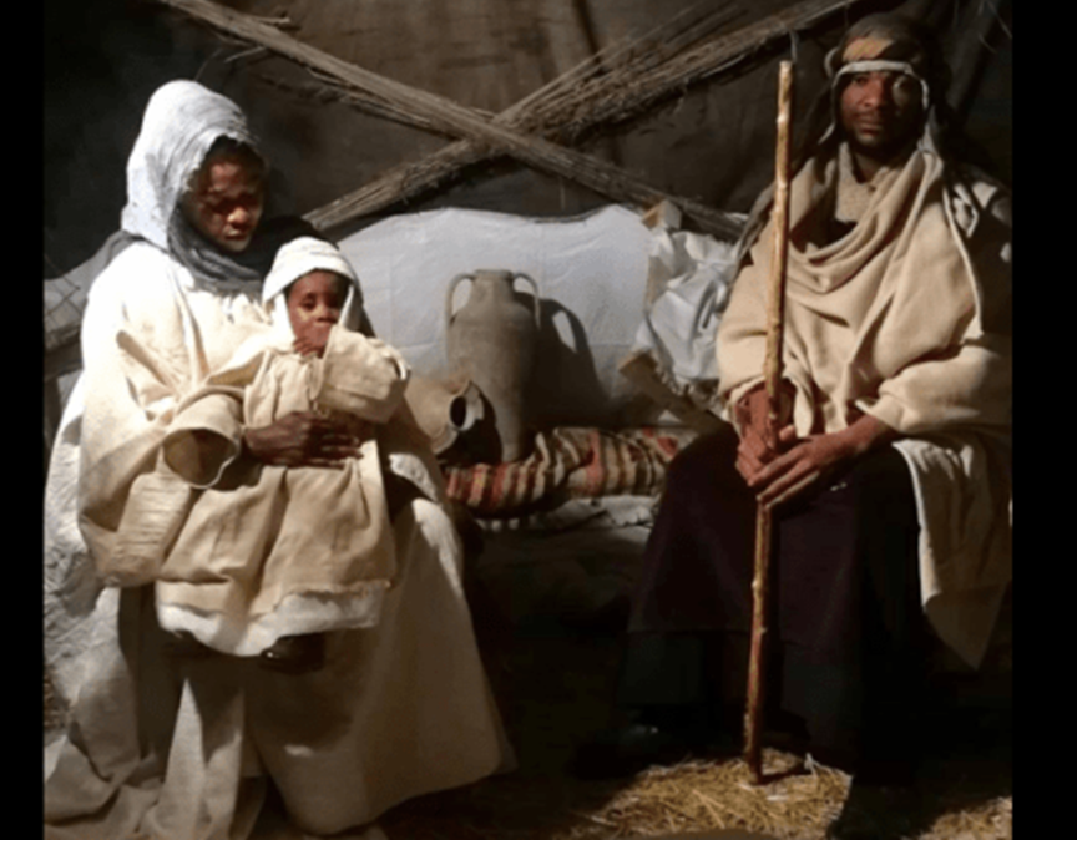
If only because the representation is dishonest. The human traffic reaching Italy and the rest of Europe in recent years is composed almost completely of males between the ages of 20-30. As an African nun commented:
“Where are all their women folk?” What the photo shows is a family. Nothing to do with the actual migrants which the institutional Church led by the reigning pope are treating with sugarcoated ‘Christianity’.
So, therefore, this friend decided to ring in the New Year in Medjugorje, thinking it would calm him down. Alas, it was the opposite. What many Catholic blogs and newspapers like
La Verita have been reporting about the priorities of Bergoglio’s demagogic-environmentalist-migrationist church was confirmed even in a holy place like Medjugorje. He says:
I would not have believed it if I had not been there myself.
The first Solemn Mass of 2019, celebrated at midnight by the Apostolic Nuncio Pezzotti with Mons. Oser (the Polish bishop sent by Bergoglio to evaluate and check out the veracity of the claimed Marian apparitions there) and the local Franciscan superior, don Milienko, for thousands of pilgrims, was highlighted by the Nuncio’s homily which provoked concern and opposition among many of those present – some of whom did leave the Mass to demonstrate their rage and dissent.
The homily was a political manifesto all but signed by Bergoglio. With the pretext of picking up the pope’s message on the World Day of Peace, Pezzoti rattled off 20 minutes of Bergoglian thought, focusing on two points with a high quotient of demagoguery and genericness: ‘good politics’ as an instrument to involve young people who have lost their trust in the church, peppered with appeals to conscience (perhaps Lutheran conscience?) and so much rhetoric about the common good, solidarity and the environment.
But he did not fail to castigate those politicians and parties who, he says, ‘wish to eliminate the migrant’. Pezzotti underscored the importance of face-to-face encounter, dialog and welcome for ‘people who have escaped wars, hunger, etc.' Obviously, Pezzotti is not aware that only about 5% of these migrants are genuine refugees from war zones.
What is really appalling is that this propaganda homily should have been said at a holy place like Medjugorje - in a country which, 20 years ago, was involved in a cruel civil war after decades of Communist oppression. The people of Medjugorje really suffered war, and in this sense, were martyrs who had no way of escape, and who after all the suffering, started to rebuild.
To begin 2019 with such a homily is a provocation and a paradox. Thousands of faithful in sub-zero weather stood on the esplanade listening to a smug bishop delivering what amounted to a campaign speech for Bergoglio to the Catholic faithful.
Day-after reactions from people who know Medjugorje was that the pilgrimage city is being ‘normalized’ along the new canons of the church of Bergoglio, before it can be ‘recognized’ officially by the Vatican as the genuine site of a Marian apparition. But they note that in the past two years, the number of pilgrims visiting Medjugorje has been drastically diminished, no small thanks to the reigning pope’s oft-expressed lack of sympathy for Medjugorje (having referred to the claimed Marian apparitions there as featuring ‘The Virgin Mary as postman’).
A parallel with China of the two churches – the clandestine, which is oppressed and persecuted, and the official, which is allied to the communist regime and the Bergoglio Vatican – is not unrealistic. Have the powers that be on Medjugorje considered that before making any strategic choice on the pilgrimage site, they should consider the Lady of Medjugorje?
And Tosatti's second post for the day - a new installment of his Bestiario Clericale:
Of another vile deed against B16, anti-EF madness in Sardinia,
and the good sense of a Sicilian scholar priest on Islam
Translated from

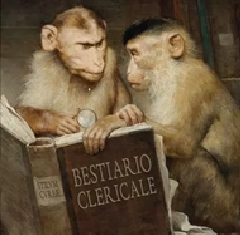
January 12, 3018
This afternoon, I thought I would be undisturbed and be able to observe my self-imposed rule not to pubish more than one self-written article a day on this site. But my calm was broken by a friend who sent me on a tweet from Austin Ivereigh. He is the Englishman who was the press officer for the late Cardinal Murphy O’Connor when the latter was Archbishop of Westminster (London).
If you recall, the cardinal was one of the leading members of the anti-Ratzinger, pro-Bergoglio Sankt Gallen Mafia
[who told Ivereigh exactly what he and his colleagues did to ensure the election of Bergoglio in the 2013 Conclave, and which Ivereigh duly wrote up in his 2014 biography of the new pope]; Bergoglio then intervened to stop the CDF from investigating an abuse accusation against Murphy O’Connor by one of his former lady parishioners.
Ivereigh quickly became one of the most outspoken defenders of the Bergoglio establishment, those around the pope who govern the Church. The Anglophone version of Spadaro or Tornielli, if we may put it that way. His tweet referred to the disclosure by the Diocese of Pittsburgh (which he wrote about yesterday) that while he was Archbishop of Pittsburgh, Cardinal Donald Wuerl had known about
at least one case of inappropriate conduct by his friend then-Cardinal McCarrick as early as 2004. Yet Wuerl claimed over and over after Mons. Viganò’s first testimony on McCarrick last year that he knew nothing at all of any reports, or even rumors, about McCarrick’s behavior. A lie about which Mons Viganò repeatedly called him out.
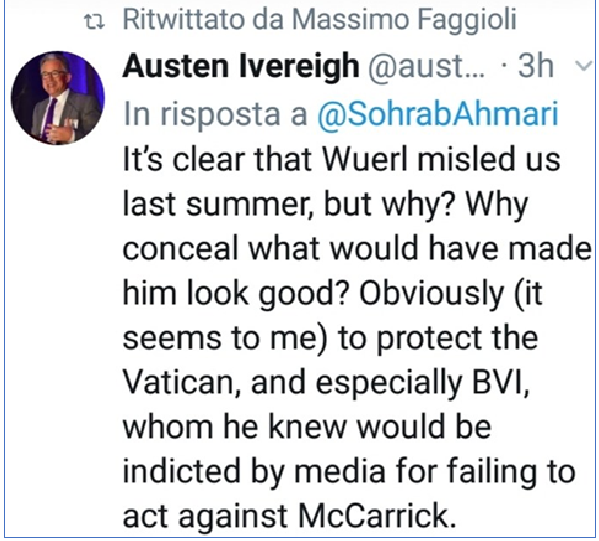
In the tweet, Ivereigh has to admit that Wuerl lied last summer. But… look at his conclusion!
After Viganò released his first Testimony, the Bergoglio press gang immediately questioned whether Benedict XVI had imposed any sanctions or restrictions at all on McCarrick. Until Cardinal Ouellet, very likely urged by the pope to reply directly to Viganò’s subsequent testimony that Ouellet knew of the sanctions against McCarrick, admitted that there were restrictions imposed which he himself had communicated directly to Viganò, then Apostolic Nuncio to Washington, and presumably to Cardinal Wuerl, as Archbishop of Washington, where McCarrick lived.
So how dare Ivereigh – in the face of that known fact, official and made public by Ouellet – now claim that colore=#b200ff][
Wuerl lied to protect the Vatican, and especially Benedict XVI. [More logically, how? By denying that he knew anything of McCarrick’s misconduct and that therefore the latter could not have been sanctioned by Benedict XVI?
By now recirculating the lie that Benedict XVI was negligent in failing to act against McCarrick, a lie that could easily be swallowed by people who have not followed this story closely. I think we have a leading candidate for the 2019 Oscar for intellectual dishonesty.
[How characteristic of the Bergogliacs to rig up some vileness against Benedict XVI to make him take the fall for Bergoglio! Another indication of their utter lack of respect for the Emeritus Pope – whom another Viganò earlier sought to claim had endorsed a Vatican-published series of booklets in praise of Bergoglio as theologian, when B16 had expressly refused to do so. Because he is an ex-pope, without any powers whatsoever, the Bergogliacs think he is completely expendable, if only to make Bergoglio look good.]
About Wuerl lying to protect the Vatican – that is plausible. And is, indeed, confirmed by facts. McCarrick enjoyed protection by highly placed officials in the Vatican [up to Bergoglio, by Viganò’s never-denied testimony]. Viganò named names [none of whom replied to his accusations other than Ouellet, who did Viganò a good service by confirming much of what Viganò had claimed]. It seems that the names mentioned do not wish any reference whatsoever to how they aided and enabled McCarrick. Perhaps because the Vatican cannot afford to have heretofore protected documents brought to light.
But one simply has to recall a string of events to get the sense of the ‘silence’.
- Cardinal DiNardo, president of the USCCB, came to Rome to ask the pope to open an apostolic investigation into the McCarrick case.
- The pope said No.
- Instead of a judicial investigation which would look into all available documents, especially those specified by Viganò, he ordered an internal Vatican administrative inquiry on the McCarrick case [in which, obviously, the pope’s investigators would be able to suppress – if not destroy – any documents that would prove the accusations made by Viganò, and at any rate, to whitewash the whole case]. As we know, not just the pope, but all the other eminences named by Viganò, have not issued any denial at all of his accusations.
I think even the pope’s rejection of the US bishops’ proposal to put the investigation of sex abuse and cover-up charges against the US bishops in the hands of competent laymen – and therefore, outside the Church’s control – had to do with eliminating any risk of embarrassing discoveries.
If this what Catholic Voices [the group founded by Ivereigh to report the truth and fight the falsehoods against the Church and Benedict XVI before his visit to the UK in 2010] has become, it would be preferable for it to shut up.
The second episode in our Bestiary today is very amusing. The blogsite Messainlatino calls attention to an article in the journal Theologica et Historica, of the Pontifical Theological Faculty of Sardinia, written by Mons. Tonino Cabizzosu, professor of Church history.
Cabizzosu claims in a couple of footnotes [this has become quite a useful ruse for Bergogliacs since AL] that the most serious problem of the Church in Sardinia is the ‘philo-Tridentine and anti-Conciliar’ drift [Bergogliacs use the terms as synonymous] by “a fringe of young priests who are critical of the Church’s post-conciliar ecclesiological openings”.
Amid empty churches, pederasty and homosexuality in the clergy, widespread corruption [brought about by clericalism, one must add] – what does this professor see as the great problem? Those who celebrate the Traditional Mass.
Quos Deus perdere vult, dementat prius! (Those whom a god wishes to destroy, he first drives mad.)
Our third narrative, fortunately, shows that not everyone, in the central Church or in the Church in Italy, has lost their common sense for ideological reasons over the question of mass migration.
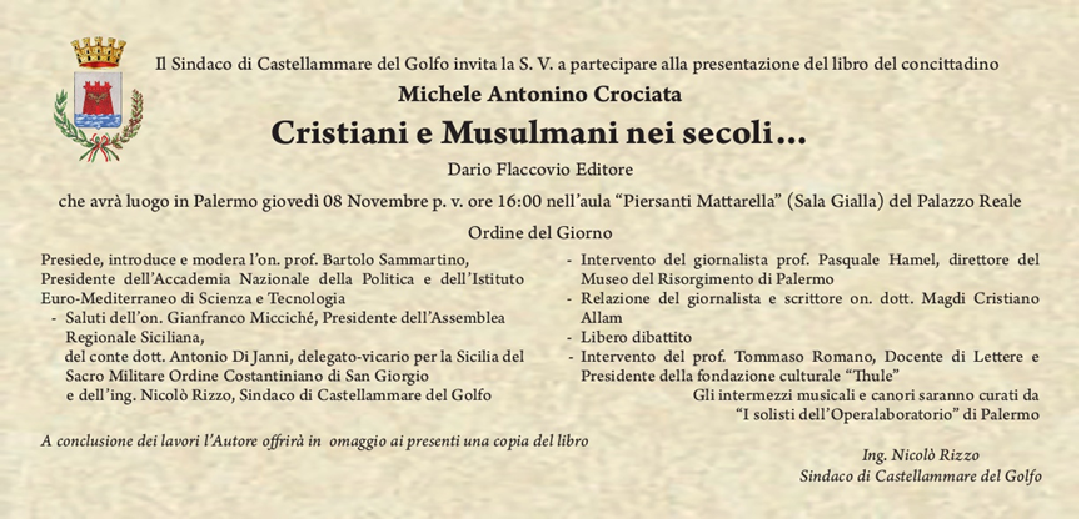
Mons Michele Crociata, a Sicilian scholar priest was interviewed recently by La Fede Quotidiana about a book he published in November, Cristiani e musulmani nei secoli (Christians and Muslims through the centuries)(2018, Flacconio).
[My contribution: The publisher’s blurb on the book said:
The text, which alternates between history and the present, analyzes a difficult problem that has remained unresolved: an epochal development which continues to assail the world, especially Europe, and Italy in particular, which had been overrun by barbarian waves in the second to the fifth century AD, and after Mohammed founded Islam, experienced cycles of attack by Muslim armies, many of them catastrophic, in the past 14 centuries. The study looks at the current Afro-Asian mass migrations to Europe, with the often inconvenient questions that the situation has raised.
The book offers the reader – and those who have political and strategic responsibilities today – a diachronic overview of the phenomenon, which has its roots in history. Such history must be read and known in order to be able to respond to the serious demands of the situation today.
The monsignor says: “The Church cannot tell the State – nor should it – how to manage the mass migration problem. What we are seeing today is an Islamic invasion”.
Monsignor Crociata, the pope and other representatives of the Catholic Church have called on politicians and the government to welcome all migrants. What do you think?
For the Church, no one is a stranger, since we are all equal before God, without distinctions. Accordingly, the institutional Church is following this postulate. However, the migrant problem is something that ought to be managed by the State and by its laws, so the Church cannot and should not interfere, especially when it cannot tell the government exactly how to manage the problem. This is not within her sphere of competence. I should add that the Catechism says we should be charitable and welcome strangers ‘according to ral and effective resources”.
So, it is not possible to indicate any unconditional solutions…
No, Besides, any self-respecting state must be cautious in assessing and controlling who enters the country, who he is and where he comes from, and whether he has a right to do so. Whoever knocks on our door must do so properly, respecting laws and customs, and adopting himself to the host country’s culture, to the customs of his hosts – otherwise, it is legitimate to refuse them entry or throw them out.
Here in Italy, out of an undisguised sense of ‘do-goodism’, we have yielded on so many things. Of course, charity has no frontiers, and all poor people are equal without distinction, but charity must always start at home, before it is extended to others. I have the impression that Italians in need have been treated worse than the migrants, a situation that understandably could result in ‘racist’ reactions.
I am thinking, for instance, of the young migrants who have become used to asking for handouts from businesses instead of working for a living. It is a mistake to accustom them to this – it encourages idleness, and the resulting troubles that idleness can bring.
If young Italians went around asking businesses for handouts, they would not be seen with benevolence at all.
You are a scholar of Islam. Is there a risk of Islamization?
It is not a risk. It already exists. The West is committing suicide. Wherever there is a spiritual void, it becomes occupied with something bad. The West is in the process of self-demolition.
Is Islam compatible with Western values?
Muslims look down on us smugly because they think we are stupid and because we have become so secularized. I am certain that sooner or later, if only through demographics, Muslims will overcome us in Europe. That has always been their historical plan. And Islam does not hesitate to dominate even by force. It is incompatible with Western values of freedom, respect and democracy. Only someone who has not read the Koran will say otherwise. To say that the Koran is merciful is false. Islam is a real menace, and the Koran justifies violence to impose Islam.
What do you think of the current pope’s attitude towards Islamist terrorism?
I am surprised that terrorism is not labelled Islamist when it is committed in the name of that religion. Maybe, because the pope is from Argentina, he does not really know Islam well enough, or he chooses to keep to an extremely prudent line. [Oh, Monsignor, how kind of you!]
[Modificato da TERESA BENEDETTA 13/01/2019 04:15]